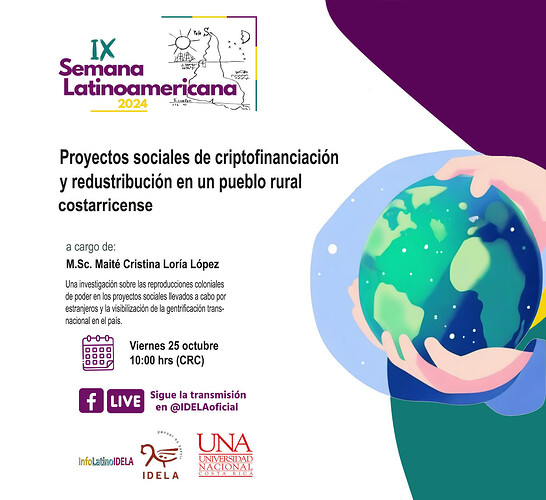Hello Flashbots community,
As you all know, per our meet & greet and project group viewing party, this project has concluded its proposed research. Below you will find a summary of this research, as it is now being submitted for publication in an academic journal that requires a variety of steps before publication, once publication happens I will return to this post and share the link to the final research article for our collective indulgence.
Additionally, I share with us a link to the selected annotated bibliography and the video presentation for those that were not able to watch it during/attend the collective watching party.
Research Summary:
This article explores the interconnections between North-South relationships, transnational gentrification and crypto funding for community projects, to both understand the limitations in the use of cryptocurrencies, as well as the possible misuse of them to further reproduce neocolonial global disparities. Based in the newly glocal, rural community of San Salvador del Barú in Tinamaste, Pérez Zeledón, Costa Rica, this research sheds light on current Costa Rican tourist migrant expat phenomenon of land appropriation as well as new socio-cultural relations between locals and foreigners. Furthermore, from a critical Latin American perspective, it offers possible pathways to transforming globalized relationships for the promotion of unity, peace and equality and the fulfillment of cryptocurrencies’ mission.
Main findings:
-
Cryptocurrencies can be and are absorbed by the capitalist dominant system and therefore used to reproduce global, glocal and local inequalities, structural violence and historical exclusion.
-
Cryptocurrency donations platforms may see their donations, visions and missions hindered by lack of intersectional analysis of the inequalities that can be experienced by a variety of subjects and how their financial support can actually support continued inequality hidden behind “social projects”.
-
Cryptocurrency literate subjects have an advantage, that can be traced in historical structures of power, global positions and predetermined opportunities, over subjects that do not have this technological knowledge, when situated in the Global South, this can involve a variety of glocal subjects.
-
There’s a variety of local professionals that can assist both cryptocurrency platforms and social project managers receiving/requesting donations to ensure that inequalities are not being reproduced.
Our research produced the following guidelines for crypto-enthusiasts, project managers and donors:
For crypto-donated social projects to embrace a full transformational effect, they must:
- Promote equality and horizontality amongst individuals involved and affected by the application of crypto-funded projects, starting by their full inclusion in the decision-process before application takes place
- Promote digital literacy through education, participation and application
- Promote cryptocurrency benefits and explain current shortcomings so individuals and collectives can take informed decisions
- Challenge historical disparities and injustices in socio-cultural relationships between humans, fauna and flora
- Encourage an intersectional approach in the development of projects, thus uniting diverse knowledge that encompasses a critical understanding of both technology, entrepreneurship, society and Nature. Understanding such an approach as a “transdisciplinary (feminist) theory that aims to learn about the complexity of identities and social inequalities through an integrated approach” (Bilge, 2009, p. 70 cited in Hirata, 2014, pp. 62-63).
- Additionally, for collectives mainly founded by foreigners of the Global North in the Global South, we consider it important that at least 50% of their donations are geared towards locally-created and approved social projects - that is projects that involve equal input from members of the collective and the local communities that are receiving them.
Bibliography
Hirata, H. (2014, June). Gênero, classe e raça Interseccionalidade e consubstancialidade das relações sociais. Dossiê - Trabalho e Gênero:Controvérsias, Tempo Social, 26 (1), 61-73. https://doi.org/10.1590/S0103-20702014000100005
